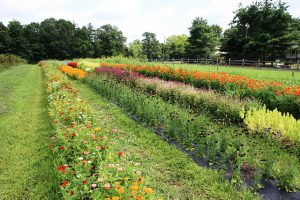Pesticides may even contaminate pollinator strips
 Photo credit: Montgomery County Planning Commission
Photo credit: Montgomery County Planning Commission
A study at Louisiana State University Ag Center shows that even areas set aside for pollinator conservation may be contaminated by neonicotinoid pesticides. Neonicotinoid insecticides are becoming more and more prevalent, including being present in surface waters, non-target vegetation, and bee products. Exposure to neonicotinoids can have serious negative impacts on bee health, even when exposure is at low levels. This study looked specifically at the neonicotinoid clothianidin, and measured levels in leaves, nectar, honey and bee bread. Researchers found that bee bread collected from organic sites had significantly less clothianidin than those from conventional farms, and that higher clothianidin levels in bee bread were correlated with decreased glycogen, lipid, and protein in workers. However, bees face exposure to neonicotinoids due to contamination from conventional farms in areas such as pollinator strips. Researchers concluded that small, isolated areas set aside for conservation do not provide spatial or temporal relief from neonicotinoid exposures in agricultural regions where their use is largely prophylactic.


